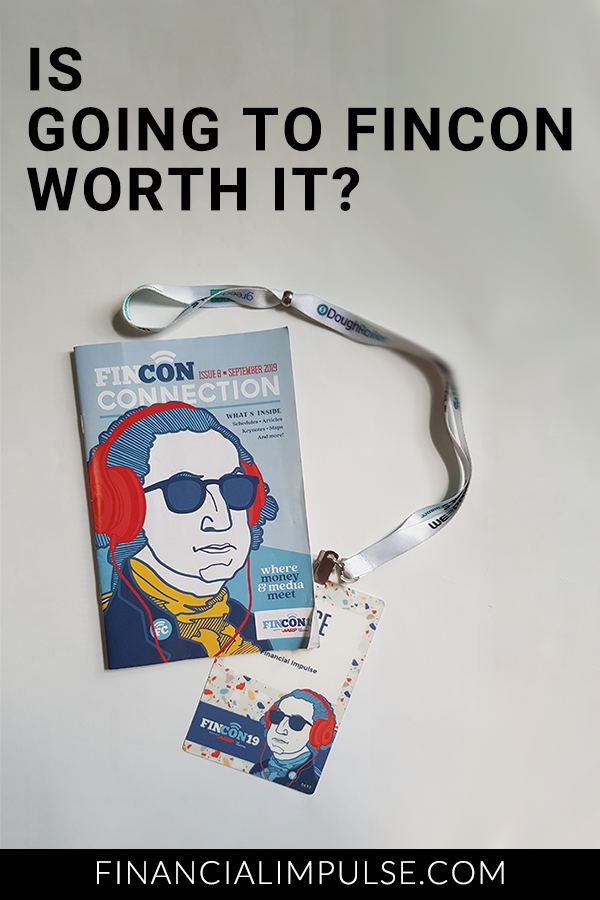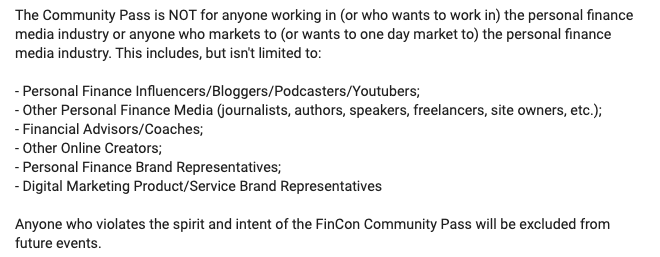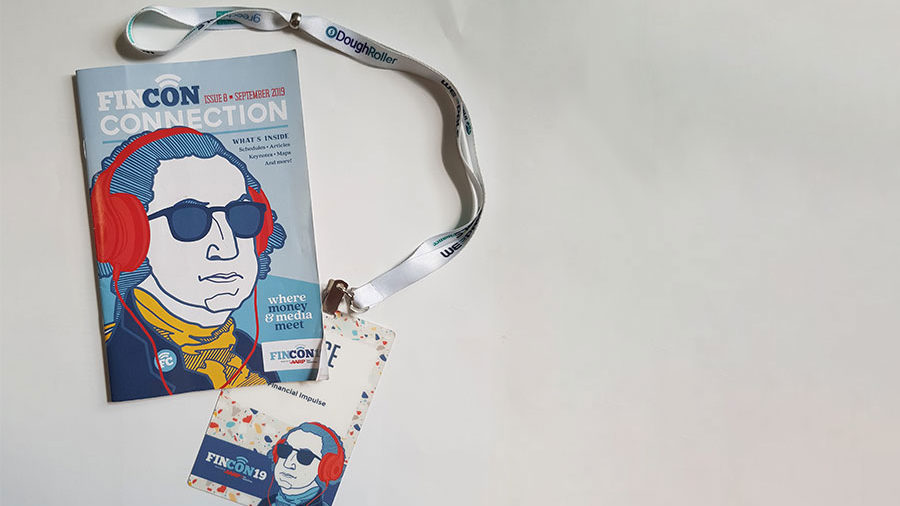You may have heard of FinCon if you’ve read enough personal finance content. Here’s why it may or may not be worth going.

Financial Impulse’s “Is It Worth It?” series takes a close look at high-cost items and experiences with the mission to break down their costs and benefits.
I spent four days last week attending FinCon—and as a first-timer, what a whirlwind it was.
Having launched Financial Impulse less than a year ago, I originally had no plans to go, as I felt my site needed to be more “established” before attending such an event would be worthwhile. Not to mention, attending FinCon was more expensive than I’d liked—certainly too expensive for something that I felt hesitant about.
Would FinCon even be worth attending as a relatively new personal finance writer? This question was my biggest source of hesitation, so I wrote off the event as an investment for next year.
However, after applying for and receiving a FinCon scholarship, I had no excuses—even as a newbie to the personal finance space, the free ticket was at least an opportunity to see what all the buzz was about.
Was going worth it?
In short, yes—I found tremendous value in attending. Of course, whether going to FinCon is “worth it” to different people will also depend on several factors, namely where it is held and what your own goals for attending are.
Table of Contents
- What is FinCon?
- Why go?
- The Cost of Attending FinCon
- How to Reduce the Cost of Attending
- Is going to FinCon worth it?
- FinCon 2019 Reviews & Recaps
- Conclusion
First, what is FinCon?
For those unfamiliar with FinCon, it’s a conference aimed at bringing together brands, content creators, and influencers in the personal finance and investing space. According to its site, FinCon organizers aspire to help all parties involved “create better content, reach their audience, and make more money.”
This year marked the conference’s ninth, making it relatively new compared to other business and media conferences in the U.S. In spite of its young age, however, FinCon has seen tremendous growth in the past several years.
In fact, in 2011, its inaugural year, FinCon launched as the “Financial Blogger Conference,” with less than 300 attendees. However, it has since rebranded and expanded to include all personal finance content creators, such as podcasters and YouTubers, rather than focus solely on traditional bloggers. This rebranding has no doubt contributed to the conference’s growth; FinCon 2019 in Washington, D.C. saw over 2,500 attendees.
It’s worth mentioning that the conference isn’t just for brands and content creators, though—money enthusiasts and people who are thinking of blogging also attend. In this way, FinCon boasts a rather diverse community, with attendees from all sorts of professional, geographic, and socioeconomic backgrounds, and all united by a common interest in personal finance.
Why go?
For me, the benefits of attending FinCon boiled down to two major areas:
- Learning and professional development – Over the course of four days, FinCon 2019 hosted a variety of discussion panels and training sessions split into several broad tracks—journalism, financial advisors, and podcasting, to name a few. And while I had originally thought of FinCon as being more meaningful for seasoned bloggers and content creators, I was wrong. A decent number of sessions were targeted at beginner bloggers and freelancers, meaning there was a lot to gain professionally from attending.
- Networking with brands, influencers, and other professionals – In addition to hosting speakers and presentations, FinCon sets up an expo hall for brands known as FinCon Central. This is the perfect opportunity for brands and content creators to kindle potential partnerships—which I definitely did not take full advantage of at FinCon 2019. Of course, networking at FinCon isn’t only for those with a business agenda, as the term “networking” generally connotes. There are plenty of scheduled meetups and parties throughout the four-day conference, and many content creators and personal finance enthusiasts attend simply for the thrill and joy of meeting each other. I personally loved meeting many of the bloggers and writers I follow; it was such a novelty to talk, laugh, and drink together in person.
Of course, no one’s twisting your arm to attend any of FinCon’s sessions, community meetups, or happy hours. In this way, as trite as it sounds, FinCon is ultimately what you make of it.
Whether you find meaningful value in attending will really depend on your own goals and how you approach the conference. That could be, for instance, by actively seeking out your favorite bloggers, meeting with brands, or going to panels and sessions.
At FinCon 2019, I met attendees who were all over the spectrum—some who went to very few sessions (or none) and focused instead on meeting brands/other bloggers, and others who only attended presentations. Some attendees (including myself) also took time to explore D.C., the conference’s venue, and meet with non-FinCon friends and family.
The Cost of Attending FinCon
I’ll admit that I wasn’t initially sold on attending FinCon when I first heard about it, in large part because of its cost. As enticing as the prospect of connecting with other personal finance content creators and enthusiasts (as well as brands) sounded, it also seemed downright pricey.
Assuming you’re traveling from out of town to attend FinCon, major expenses include:
- Airfare
- Housing
- Local transportation
- Dining
- A conference pass
- Time off, paid or otherwise – If you have a full-time job that’s not blogging, don’t forget to factor in the cost of using PTO in order to attend FinCon. Alternatively, even if you blog or freelance full-time, the decision to attend FinCon means cutting back on hours spent working and generating revenue.
- Brand materials (optional) – This includes printing business cards, media kits, T-shirts, and any other merchandise for your brand, if you so desire.
In total, my own FinCon 2019 experience cost roughly $617, plus three vacation days.
How to Reduce the Cost of Attending
The cost of attending FinCon is in large part dependent on where it’s held and your proximity to this location. However, it’s more than possible to reduce your overall trip expenses—you can do so with the following strategies.
Apply for a FinCon Scholarship or Community Pass
As mentioned earlier, I received a scholarship to attend FinCon. This scholarship covers the cost of FinCon’s basic influencer pass; and while you still have to cover your own airfare and lodging, getting this free ticket can save you a decent chunk of change.
If you meet the scholarship’s criteria, you’ve got nothing to lose by applying. Eligible applicants are new content creators and freelance writers who have only entered the personal finance space in the last year or so.
However, if content creation isn’t your thing, you may be the perfect candidate for FinCon’s Community Pass instead—though this also depends on the scope of your involvement in the personal finance community. Unlike FinCon’s basic and pro passes, the Community Pass runs at a discounted rate and is targeted toward personal finance enthusiasts instead of brands and influencers.

It’s the perfect option for those not interested in content creation but would like to connect with other personal finance enthusiasts and hear from FinCon’s keynote speakers and presenters.
Buy your ticket early
The earlier you buy tickets to FinCon, the cheaper they’ll be. In fact, taking advantage of FinCon’s early bird pricing could save you a few hundred.
Even if you’re not 100% committed to attending, consider buying a ticket early to be safe. You can resell your ticket (with a transfer fee) later on if you ultimately decide against it or your plans change.
Pack snacks and eat in
This frugal “hack” is effective for saving whenever and wherever you’re traveling, whether it’s to FinCon or somewhere else. What’s more, the extent to which you practice this saving strategy is totally up to you. For instance, eating in for lunch but going out for dinner will do wonders for your wallet compared to eating out for every meal.
And if you feel like eating in will take away from networking, rest assured: there are plenty of parties, happy hours, sessions, and other conference-sponsored events that suggest otherwise.
Find a roommate and/or stay somewhere close to the conference
To lower your lodging expenses, find a roommate to split your hotel room with. Fortunately, the FinCon Community Facebook group has a public spreadsheet for this very reason; use it to connect with other attendees looking for a roommate.
Alternatively, if the conference’s hotel pricing doesn’t suit your budget, look into other housing options nearby. This is what I did: I found an Airbnb that, though a 15-minute walk away, cost $214 total—significantly cheaper than staying at the conference location, the Washington Hilton. Of course, this cost-convenience tradeoff certainly isn’t for everyone. (I personally enjoyed walking and got great recommendations from my Airbnb host.)
Use public transit
Depending on the convenience and availability of public transportation where FinCon is held in a given year, you can easily reduce your transportation costs by using public transit rather than renting a car or only using taxis and rideshare services.
For FinCon 2019 in Washington, D.C., I used the the city’s Metro service a few times—such as going from the airport to my Airbnb, and when meeting up with friends.
Split taxis and Uber/Lyft rides with other conference attendees
Though more expensive than public transit, taxis and rideshare services offer more convenience. You can easily reduce their cost by splitting rides with other conference attendees—for instance, if you’re staying at the same hotel.
Fortunately, FinCon being FinCon, you’re in good company, as chances are, many other attendees are also looking to save a few bucks. If you can coordinate rides with other attendees, you can easily reduce the cost of transportation.
Is going to FinCon worth it?
Since FinCon’s location changes annually, the cost of attending will inevitably vary, especially based on where you drive or fly in from. As a result, determining whether or not FinCon is “worth it” really depends—on your budget as well as your goals for attending the conference.
When deciding whether or not to go, I suggest identifying your ideal price point—the amount you feel you would reasonably pay for attending FinCon. Then look into the cost of flying, housing, and so on. Do these projected trip expenses fit your price point?
Moreover, if you’re looking to create content to make money, it’s definitely worth considering your business goals and the potential ROI of attending. What are you hoping to get out of FinCon? That could be:
- Face-to-face contact with a certain number of brands
- A specific number of clients or leads
- FinCon-specific deals on software and other tools for your site
Some people might argue that the friendships made at FinCon are priceless—and sure, there’s a sentimental value money can’t buy. But if the total cost of going exceeds your ideal price point (for instance, if it cost $10,000 to attend the four-day conference), you’re probably better off meeting other personal finance enthusiasts through other meetups and events.
FinCon 2019 Reviews & Recaps
In the weeks leading up to FinCon 2019, I found bloggers’ recaps of the conference from previous years incredibly helpful. So if you’re curious about the day-to-day minutiae of attending, check out the recaps of FinCon 2019 from some attendees below.
- A Purple Life – “The Ultimate FinCon Bootcamp: Sleep, Sprint, Yell, Fast!”
- Catherine Alford – “FinCon 2019 Recap (aka that time I spoke in front of 2,000 people)”
- Dollar Revolution – “The Ultimate FinCon 2019 Recap Roundup“
- Financial Freedom Countdown – “First timer FinCon 2019 recap including a delightful surprise“
- Free, Fun, Family – “The Value of Investing in What You Love: Takeaways from #FinCon19”
- Minafi – “FinCon 2019 – Washington, D.C, Friends and Inspiration”
- Wallet Hacks – “FinCon 2019 Recap: The Most Fun You’ll Have at a ‘Work’ Conference”
Conclusion
As a first-timer and lucky scholarship recipient, I definitely thought FinCon was more than worthwhile. However, I’m sure there are attendees that disagree—and to each their own.
Though FinCon 2020 is more than a year away, I’ve already bought my ticket. Unless plans change, I’m looking forward to round 2!






Nice meeting you at FinCon! looking forward to next year 🙂
Great meeting you too, Erik!
Congrats, fellow scholarship winner!
I also found FinCon worthwhile. Hope to meet up next year.
Thanks so much, Diana—and yes, let’s please meet up next year!